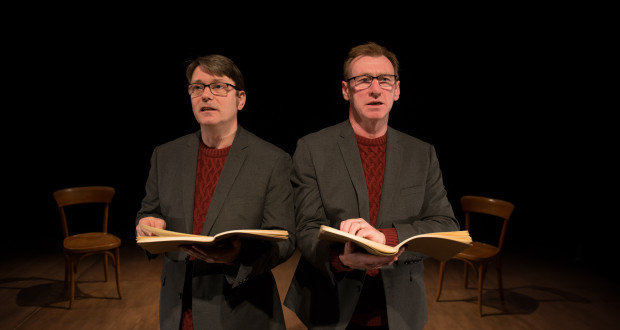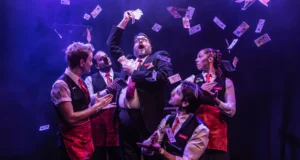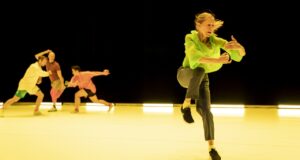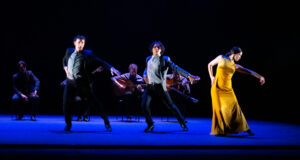Pros: An interesting, experimental exploration of the issues surrounding war, with good performances.
Cons: A very long show which meant that I, and I suspect most of the audience, lost concentration and drifted away. I felt this show collapsed under its own ideas. It could have been cut down, if only for the sake of my legs.
Summary
Rating
Good
Set during World War Two, and based on a novel by Hungarian writer Ágota Kristóf, The Notebook tells the tale of a pair of startling twins. When supplies in the big town they are living in start to dwindle, and their mother can no longer care for them, they are placed in the care of their unyielding Grandmother. What follows is the twins’ documentation of the facts and figures of the town. They resolve to tell only the truth. Thus, the audience are presented with stark descriptions of what happens to them, and what they see.
In places this makes for some pretty uncomfortable content. Not just the sexually explicit events which they witness and are involved in, but also some of the brutality with which they observe life. Their apparent detachment from the emotional aspects of the things they comment on, which only increases as the play and the war progresses, did raise some questions for me. To what degree did the brutality of the war that surrounded them shape their worldview? How much was just them?
The apparently naive and childlike language, delivered with such simplicity by the identically dressed Robin Arthur and Richard Lowdon, only serves to emphasise the alternating humanity and barbaric nature of the villagers who they meet. This isn’t a town populated with the most pleasant of people – but is anyone to blame for that?
Unfortunately my thoughts about the nature of human suffering were somewhat curtailed by the increasing numbness induced by my chair. This play is long. It runs at over two hours with no interval. I wasn’t surprised when a few people started drifting out of the auditorium towards the end of the play, or the minute the applause started.
Whilst Arthur and Lowdon delivered almost impeccable performances, I don’t think I was alone in finding my concentration wandering towards the end. On one hand the minimalist staging of neutral, subtlety varied lighting, and two wooden chairs didn’t detract from the performance and story. However, equally it was yet another way in which the show lacked in engaging its audience. At times I felt like the show would have worked better as an audiobook. Closing my eyes at points certainly didn’t feel like it was detracting from the experience. The seemingly unpredictable but synchronised movements around the stage of the actors failed to significantly contribute in any way to the piece.
What I did find interesting was how, despite the huge similarities of the performances from Arthur and Lowdon, both visually and in manner of delivery. I became more and more aware as I observed them of the subtle differences between the two. This delicate evidence of difference in the characters was fascinating, in the absence of much else that differentiated this from an audio play. But I can’t help but feel this didn’t save the play – very little was going to manage that in the face of such a lengthy, difficult, experimental piece.
Conceived and devised: Forced Entertainment
Based on the book by: Ágota Kristóf
Director: Tim Etchells
Box Office: 020 7223 2223
Booking Link: https://www.bac.org.uk/content/39433/whats_on/whats_on/shows/the_notebook
Booking Until: November 14th, then touring. Please check Forced Entertainment’s website for more details.
 Everything Theatre Reviews, interviews and news for theatre lovers, London and beyond
Everything Theatre Reviews, interviews and news for theatre lovers, London and beyond



